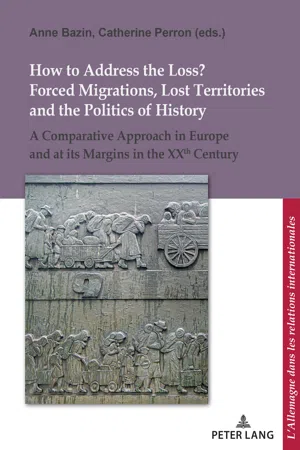
How to Address the Loss? Forced Migrations, Lost Territories and the Politics of History
A Comparative Approach in Europe and at its Margins in the XXth Century
- 234 pages
- English
- PDF
- Available on iOS & Android
How to Address the Loss? Forced Migrations, Lost Territories and the Politics of History
A Comparative Approach in Europe and at its Margins in the XXth Century
About This Book
The map of Europe has been redrawn several times during the XX th century, in peaceful or violent ways, and the shifting of borders has often been associated with forced migrations. But despite the fact that this has been the fate of millions of Europeans, the memory of it has so far received little attention beyond national borders. This book examines how hosting states and societies, as well as groups that were forced to leave, deal with the memory of the loss in the long term. It explores the politics of history and the conflicting interpretations of the loss associated with forced migrations.
In a comparative and diachronic approach, the book depicts the interactions between the actors involved in the politics of history: their motivations, their resources and the public they seek to address. It looks at the different contexts in which these actors evolve and traces the changes of these politics in time and space. It shows how the memory of territorial loss associated with forced migrations interferes with the present and how it has evolved within the political constrains of good neighborhood as well as of European and international standards that have emerged since the end of the cold war.
By confronting case studies in Europe and at its margins, the book questions the emergence of more inclusive collective memories and memory cultures. It is a significant contribution to a comparative approach on forced migrations and politics of history relating to loss.
Frequently asked questions
Information
Table of contents
- Cover
- Editors’ Acknowledgements
- Contents
- Methodological Considerations in Addressing the Issue of Forced Migrations, Lost Territories and Related Politics of History: A Comparative Approach (Anne Bazin and Catherine Perron)
- The “German East”: Myth? Reality? Lost Land of Dreams? (Eva Hahn and Hans Henning Hahn)
- Private versus Public: The Memorialization of the Exodus of the Istro-Dalmatians, 1945–2015 (Gustavo Corni)
- Karelia, The Politics of History of the Lost Land: Shifting European, National and Regional Approaches to the History of Karelia (Beata Halicka)
- The Kresy in Polish Memory: Between a Lost Arcadia and the Bloodlands of East-Central Europe (Beata Halicka)
- The Ties of Greek and Turkish Refugees and “Exchangees” to their Lost Homelands: An Asymmetry of Memory (Michel Bruneau)
- Turkey’s Guiding Light and Consolation in Addressing the Loss: Nationalism (Etienne Copeaux)
- Broken Lives, Silenced Memories and Reappropriations of the Past: The Jews of Egypt and Islamic Countries (Michèle Baussant)
- List of Abbreviations
- List of Tables and List of Figures
- Index
- List of contributors
- Abstracts